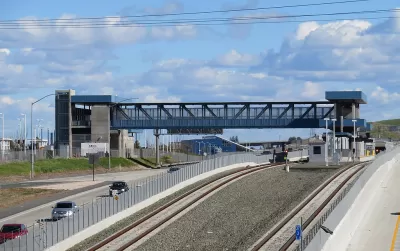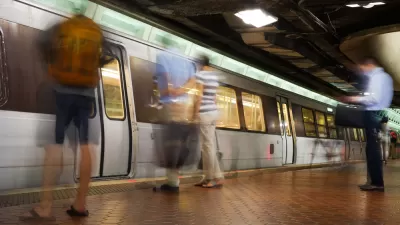European researchers have published a new study in the journal Transportation Research Part D: Transport and Environment that might be a hard pill to swallow for some transit advocates.

Eva Heinena and Giulio Mattio published an article titled "Multimodality and CO2 emissions: A relationship moderated by distance" in the latest volume of Transportation Research Part D. The article tests the relationship between multi-modality and carbon emissions, finding that distance contributes much more to emissions than relative levels of multi-modality.
The perhaps surprising finding of the study: many multi-modal trips aren't effective in reducing emissions. Here's how the authors describe that finding in the abstract: "We find that the level of multimodality is only weakly associated with CO2 emissions. It is only when controlling for levels of travel activity (trip frequency, total distance travelled) that a moderate association in the expected direction is observed (i.e. that higher levels of multimodality correspond with lower CO2 emissions)."
The authors note that the reduction of carbon emissions is not the only goal of public transit, but that the research makes it clear that merely supplying multi-modal options will not be enough climate mitigation activity. "More attention needs to be paid to the key role of high levels of travel activity, and how these could be reduced," according to the study's authors.
FULL STORY: Multimodality and CO2 emissions: A relationship moderated by distance

Planetizen Federal Action Tracker
A weekly monitor of how Trump’s orders and actions are impacting planners and planning in America.

Map: Where Senate Republicans Want to Sell Your Public Lands
For public land advocates, the Senate Republicans’ proposal to sell millions of acres of public land in the West is “the biggest fight of their careers.”

Restaurant Patios Were a Pandemic Win — Why Were They so Hard to Keep?
Social distancing requirements and changes in travel patterns prompted cities to pilot new uses for street and sidewalk space. Then it got complicated.

DC Area County Eliminates Bus Fares
Montgomery County joins a growing trend of making transit free.

Platform Pilsner: Vancouver Transit Agency Releases... a Beer?
TransLink will receive a portion of every sale of the four-pack.

Toronto Weighs Cheaper Transit, Parking Hikes for Major Events
Special event rates would take effect during large festivals, sports games and concerts to ‘discourage driving, manage congestion and free up space for transit.”
Urban Design for Planners 1: Software Tools
This six-course series explores essential urban design concepts using open source software and equips planners with the tools they need to participate fully in the urban design process.
Planning for Universal Design
Learn the tools for implementing Universal Design in planning regulations.
Heyer Gruel & Associates PA
JM Goldson LLC
Custer County Colorado
City of Camden Redevelopment Agency
City of Astoria
Transportation Research & Education Center (TREC) at Portland State University
Camden Redevelopment Agency
City of Claremont
Municipality of Princeton (NJ)





























